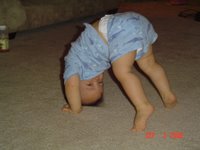
Every parent knows well:
no matter what you tell your child to do, he will always do the opposite.
*********************
Whenever your kids are out of control, you can take comfort from the thought that even God's omnipotence did not extend to His kids. After creating the heaven, the earth, the oceans, and the entire animal kingdom, God created Adam and Eve. And the first thing He said to them was
"Don't".
To the animals, He never said, "Don't" - he hurled no negatives at the elephant - but to the brightest of His creatures, the ones who get into Yale, He said,
"Don't"."
Don't" what? Adam replied.
"Don't eat the forbidden fruit."
"Forbidden fruit? Really? Where is it?"
Is this beginning to sound familiar? You never realized that the pattern of your life had been laid down in the Garden of Eden.
"It's over there," said God, wondering why He hadn't stopped after making the elephants.
A few minutes later, God saw the kids having an apple break and He was angry.
"Didn't I tell you not to eat that fruit?" the First Parent said.
"Uh-huh," Adam replied.
"Then why did you?"
"I don't know," Adam said.
At least he didn't say, "No problem."
"All right then, get out of here! Go forth, become fruitful, and multiply!"
This was not a blessing but a curse:
God's punishment was that Adam and Eve should have children of their own. And so, they moved to the east of Eden, which was still the good part of town, and they had your tipical suburban family: a couple of dim-witted boys. One of these boys couldn't stand the other; but instead of just leaving Eden and going to Chicago, he had to kill him.Thus the pattern was set and it never has changed.
But there is reassurance in this story for those of you whose children are not doing well.
If you have lovingly and persistently tried to give them wisdom and they haven't taken it, don't be hard on yourself. If God had trouble handling children, what makes you think it would be a piece of cake for you?
***************************
From:
"Fatherhood" - Bill Cosby



